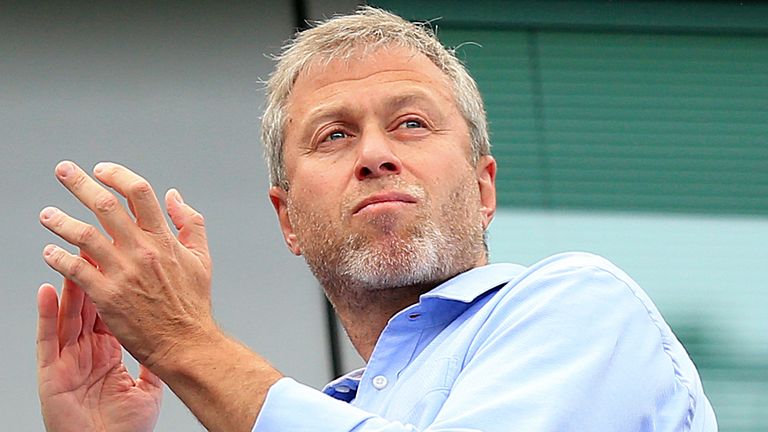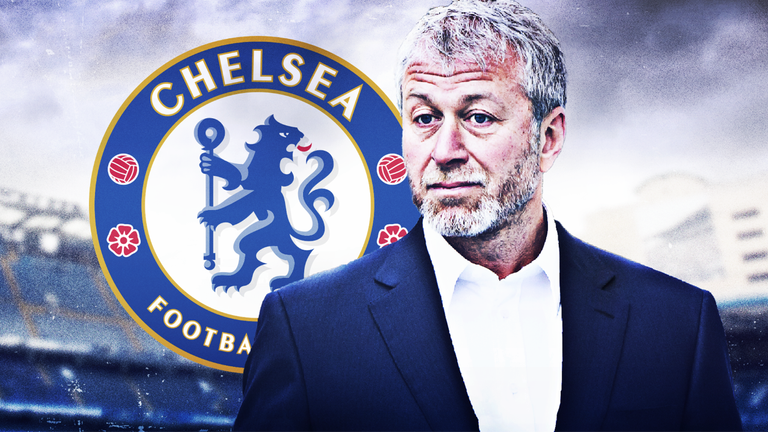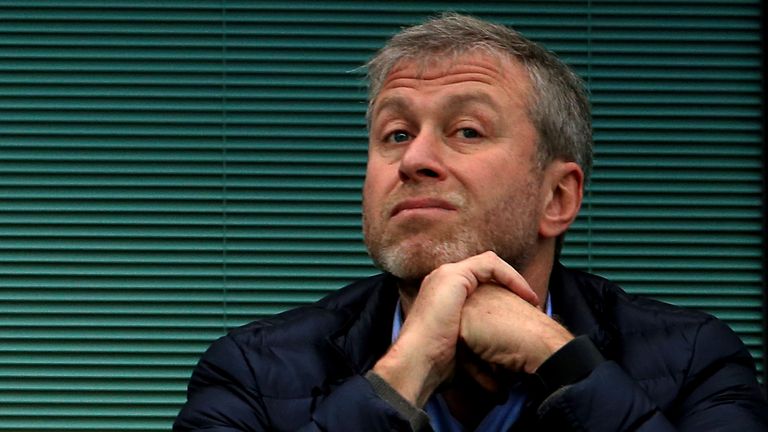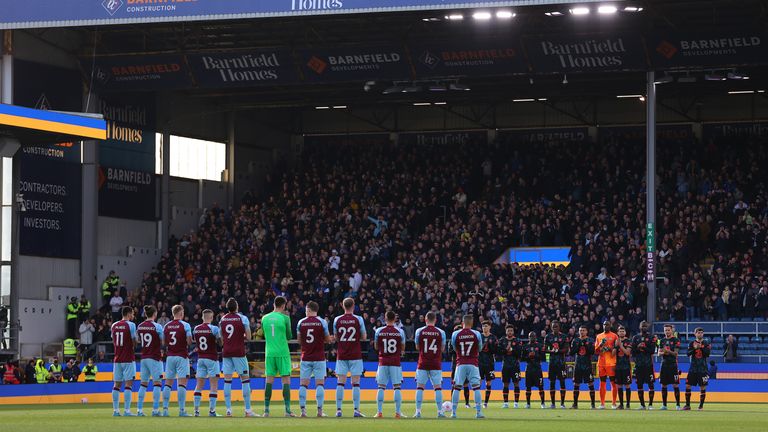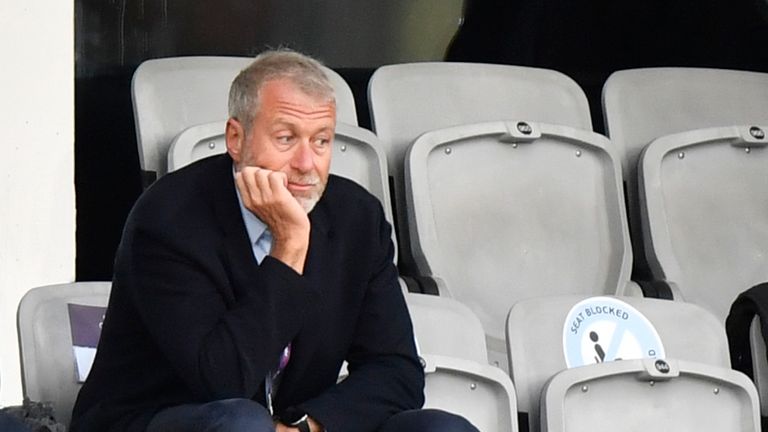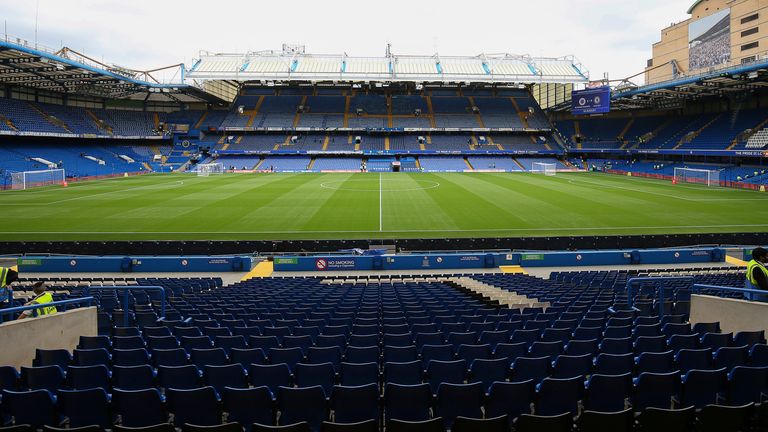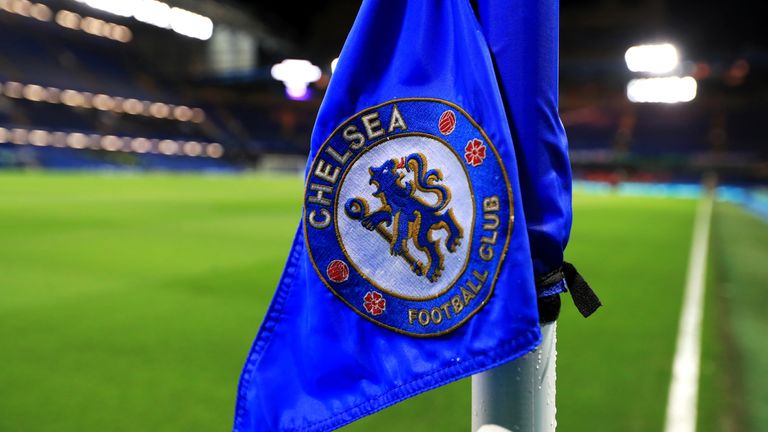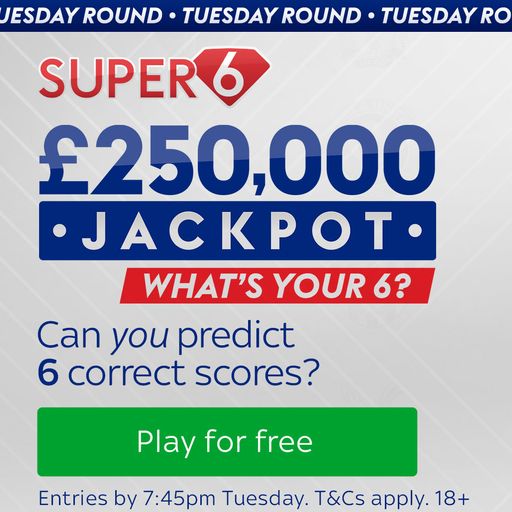Chelsea owner Roman Abramovich sanctioned by UK Government
Chelsea owner Roman Abramovich has been sanctioned by the UK government; banned from transactions with UK individuals and businesses; Chelsea given special licence to continue to operate; only existing ticket holders can attend games
Saturday 12 March 2022 08:21, UK
Chelsea owner Roman Abramovich has been sanctioned by the UK government - meaning he is now unable to sell the club.
Abramovich has had "his assets frozen, a prohibition on transactions with UK individuals and businesses, a travel ban and transport sanctions" imposed on him.
The sanctions are intended to stop the 55-year-old from making any money in the UK - and this includes from Chelsea. An application to the UK government can be made to sell Chelsea in the future as long as Russian-Israeli billionaire Abramovich does not profit or make any money from the transaction.
The government has granted Chelsea a special licence to allow fixtures to be fulfilled, staff to be paid and existing ticket holders to attend matches.
But all Chelsea teams are now banned from:
- Offering new contracts to players or staff - Antonio Rudiger, Andreas Christensen and Cesar Azpilicueta see their deals expire on June 30
- Conducting any official transfer business, including women's team
- Selling new tickets to any game for any of their teams - including women and junior sides (season-ticket holders and existing ticket holders only)
- Selling merchandise to fans (existing merchandise can be sold via third parties)
- No stadium work or redevelopment
- Spending over £500,000 on security, stewarding and catering costs per home match and over £20,000 expenses per away games
Nadine Dorries, the minister for Sport and Culture, tweeted: "I know this brings some uncertainty, but the Government will work with the league & clubs to keep football being played while ensuring sanctions hit those intended. Football clubs are cultural assets and the bedrock of our communities. We're committed to protecting them."
A government statement said: "Given the significant impact that today's sanctions would have on Chelsea football club and the potential knock-on effects of this, the Government has this morning published a licence which authorises a number of football-related activities to continue at Chelsea.
"This includes permissions for the club to continue playing matches and other football-related activity which will in turn protect the Premier League, the wider football pyramid, loyal fans and other clubs. This licence will only allow certain explicitly named actions to ensure the designated individual is not able to circumvent UK sanctions. The licence will be kept under constant review and we will work closely with the football authorities."
Chelsea released a statement nearly five hours after the news broke, saying: "We will fulfil our men's and women's team fixtures today against Norwich and West Ham, respectively, and intend to engage in discussions with the UK Government regarding the scope of the licence.
"This will include seeking permission for the licence to be amended in order to allow the Club to operate as normal as possible. We will also be seeking guidance from the UK Government on the impact of these measures on the Chelsea Foundation and its important work in our communities."
Sky Sports News understands that Chelsea and government officials will meet on Thursday.
- Chelsea fans chant 'Abramovich' during Ukraine tribute | Tuchel: Not the moment
- Gary Neville reacts to shock Roman Abramovich statement
- Thomas Tuchel: Roman Abramovich sale 'hasn't sunk in yet' | 'It's a massive change'
Meanwhile on Friday, ten members of the board of Russian steelmaker Evraz quit as a result of the sanctions imposed on Abramovich, its largest shareholder, and the suspension of the company's shares.
Among the reasons for sanctioning Abramovich, Britain said he had destabilised Ukraine through his "effective control" of Evraz which, it said, may have supplied steel to the Russian military which may have been used in the production of tanks.
Abramovich has owned Chelsea since 2003 and the club have won 21 trophies in 19 years during his stewardship.
Why government are sure Abramovich is close to Putin
Sky Sports News' chief reporter Kaveh Solhekol:
The reason this has happened is because the UK government have decided Roman Abramovich is close to Vladimir Putin.
They describe him as a pro-Kremlin oligarch, and they also say he has been found to have received preferential treatment and concessions from the Russian government. They say he is involved in undermining Ukraine and threatening its territorial integrity, sovereignty and independence.
They also go into some detail about the fact he is a major shareholder in a steelmaking and mining company called Evraz PLC, which he effectively controls, and they say that company may have supplied steel to the Russian military, which is used for building their tanks.
The UK government are 100 per cent sure Abramovich is close to Putin, despite his denials.
Chelsea can continue to operate but club is in limbo
Sky Sports News' chief reporter Kaveh Solhekol:
The sale is on hold for the time being. Roman Abramovich will not be able to sell Chelsea. From the beginning of this process, he's been on the back foot, he's not been in control of this situation - the government has.
He came up with the scheme to hand over control but not ownership of the club to the trustees of the Chelsea Foundation charity. That didn't work, so he released a statement saying he wished to sell the club, and that all proceeds would go to a new foundation that he would set up to help all victims of the war in Ukraine.
That's what he wanted to do, but all along there has been the threat of the UK imposing sanctions on him. He's now not allowed to make any money in the UK, and won't be able to sell Chelsea.
But Chelsea is seen by the government as being a significant cultural asset, thereby they've given Chelsea a licence. So despite the sanctions, they can carry on operating, fulfilling their fixtures.
But effectively, they are in limbo. There are a lot of things they can't do.
They can carry on paying their players, but they will not be able to make new signings. They can't sell tickets for games, so only season ticket holders or people who already have bought tickets can go to games.
They won't be able to make any money from merchandise. They'll be able to carry on paying their players and day-to-day bills.
It goes into detail, even about how much money they can spend on travel to away games. Per team at the club, they can spend up to £20,000 on travel. For home games, they can spend up to £500,000 per game on security, catering and stewarding, but no more than that.
What this means for Abramovich is that Chelsea is now effectively out of his control now. It is operating under a special licence now, and that licence will be continually reviewed.
For Chelsea as a club, in the short-term, they can continue to operate on a match-by-match basis, but long-term things are very, very uncertain.
We will get into things like player contracts, the transfer window opening, whether players who are out of contract will want to stay at the club, whether the big-star players will want to stay.
The staff will carry on being paid, the government have made that clear.
If you go to a game at Stamford Bridge, I imagine you'll still be able to buy food and drink, but you won't be able to buy anything from the club shop.
If you don't have a ticket, you won't be able to watch Chelsea, unless you go to away games. It's a lot to digest for Chelsea supporters.
A lot of people will be saying they feel sorry for Chelsea supporters, but they're not the victims here, there are far more important things going on in the world than football at the moment.
What does this mean for the sale of Chelsea?
Stephen Taylor Heath, sports lawyer:
The short answer is, no he can't [sell the club]. The freezing of an asset literally means the freezing of an asset. Chelsea is a physical item, there is lots of organic parts to the club, unlike a yacht, and that is why the government has issued a special licence which effectively means the club can continue trading and operating based on its current commitments and obligations.
So the current season-ticket holders can attend games because they've already contracted with the club, spectators who want to buy tickets for games can't because that is a new transaction.
That is at one level, new players would be another new contract, even potentially new contracts with existing players could be new contracts. And clearly what would be a new contract would be the sale of the club.
So in short, based on this freezing order, no he can't sell the club. Now if the government is prepared to give a special licence in relation to the operation of the club, then the question is whether they would then give another special licence in relation to the sale of the club.
But based on the terms of this freezing order, no he can't.
How much will this hurt the club financially?
Analysis by Sky News' business presenter Ian King:
There is a real question over the short-term sustainability of Chelsea FC as while they can receive prize money and TV money, but they are banned from selling new tickets, they can carry on receiving money from season-ticket holders who have not quite completed the purchase of their season tickets yet.
But that is not going to bring in a lot of cash, so that is the question I would want answering from the football club - how much cash do they have to continue paying and running their day-to-day operations?
The last accounts were published just after Christmas and that covered the period up until the end of June last year - there was some cash on the balance sheet, but those figures are just a snapshot from last year.
We do not know how much cash Chelsea are currently sitting on, how much cash they have available to meet their present outgoings. So without knowing the detail behind that, you would have to speculate that the club may have some difficulty meeting its bills and potentially paying wages in due course. And that would be the real concern.
Supporters' Trust want golden share | Shirt sponsor 'reviewing position
A Chelsea Supporters' Trust Spokesperson said: "The CST notes with concern the Government's statement regarding the owner. Supporters must be involved in any conversation regarding ongoing impacts on the club and its global fan base.
"The CST implores the Government to conduct a swift process to minimise the uncertainty over Chelsea's future, for supporters and for supporters to be given a golden share as part of a sale of the club."
The Premier League said in a statement: "Following the UK Government's announcement that sanctions have been imposed against Roman Abramovich, the Premier League can confirm tonight's match between Norwich City FC and Chelsea FC will go ahead as planned.
"The League will now work with the club and the Government to ensure the season will proceed as planned and in line with the Government's intention."
Abramovich, who last month put Chelsea up for sale due to the threat of government action, has been sanctioned along with six of Russia's wealthiest and most influential oligarchs, whose business empires, wealth and connections are closely associated with Vladimir Putin's regime. They have a net worth of £15bn.
Chelsea's shirt sponsor, telecommunications company Three, have placed their three-year deal which was announced in January 2020, under review. A company spokesperson said: "We are in discussions with Chelsea and reviewing our position."
Prime Minister Boris Johnson said: "There can be no safe havens for those who have supported Putin's vicious assault on Ukraine. Today's sanctions are the latest step in the UK's unwavering support for the Ukrainian people. We will be ruthless in pursuing those who enable the killing of civilians, destruction of hospitals and illegal occupation of sovereign allies."
Foreign Secretary Liz Truss said: "Today's sanctions show once again that oligarchs and kleptocrats have no place in our economy or society. With their close links to Putin they are complicit in his aggression.
"The blood of the Ukrainian people is on their hands. They should hang their heads in shame."
Brentford suspend ticket sales for Chelsea trip
Brentford have suspended sales of tickets for their away game Chelsea on April 2.
Under the terms of the licence issued to Chelsea, the club is not allowed to sell new tickets for games but can honour existing sales.
A Brentford statement said: "We are seeking clarification from the Premier League as to what this means for our away ticketing allocation at the match at Stamford Bridge on Saturday 2 April.
"We will confirm what this means for the Bees fans who have already purchased a ticket for this game and what this means for the remaining tickets yet to be allocated to Brentford supporters.
"The planned release of the next batch of away tickets for this match, due to open at 2pm today, Thursday 10 March, will not take place this afternoon as we seek further clarity from the authorities.
"Prior to 10 March we made a contractual commitment to take our entire allocation of 3,000 tickets for this match and will do everything in our power to ensure our full allocation is distributed to Bees fans."
